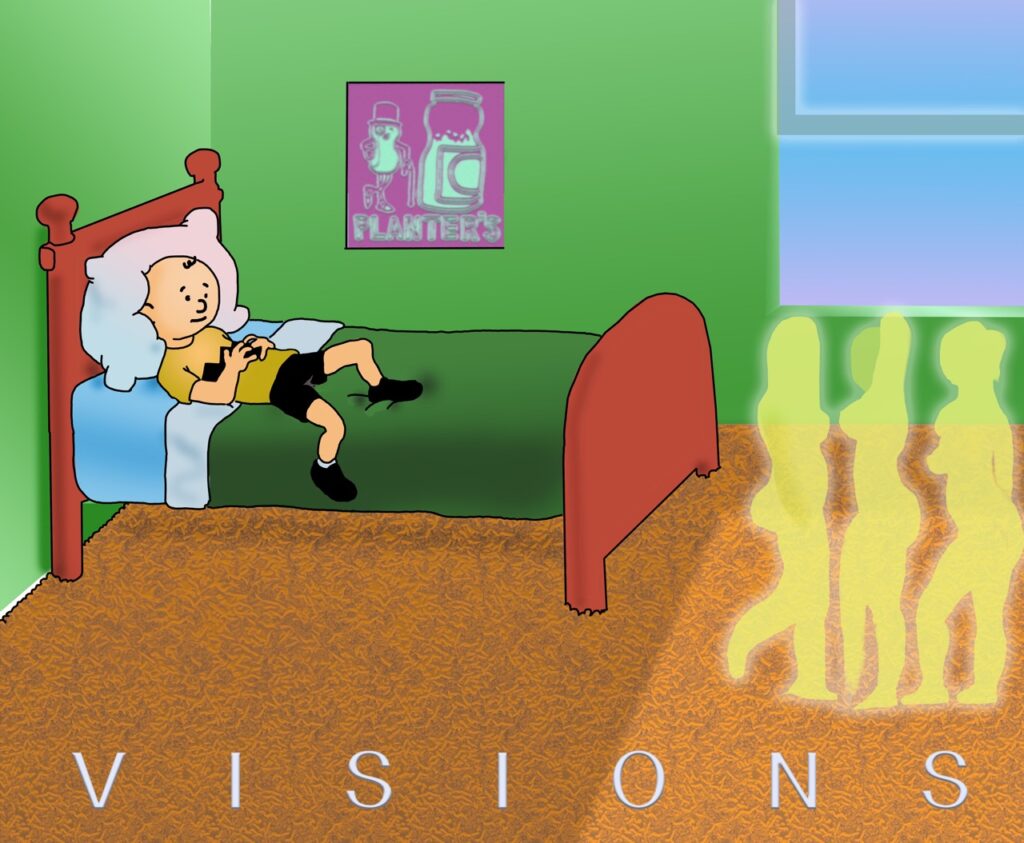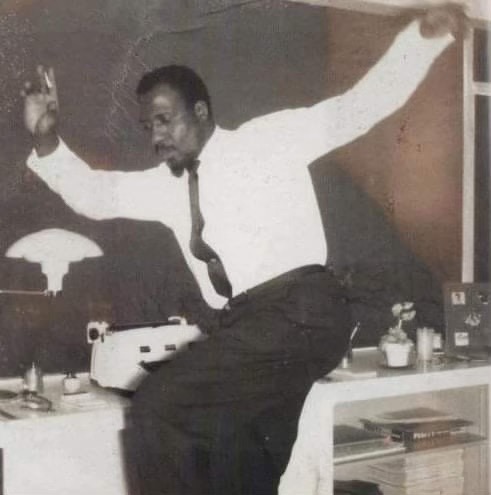“There are only two kinds of music: good music and the other kind.” -Duke Ellington
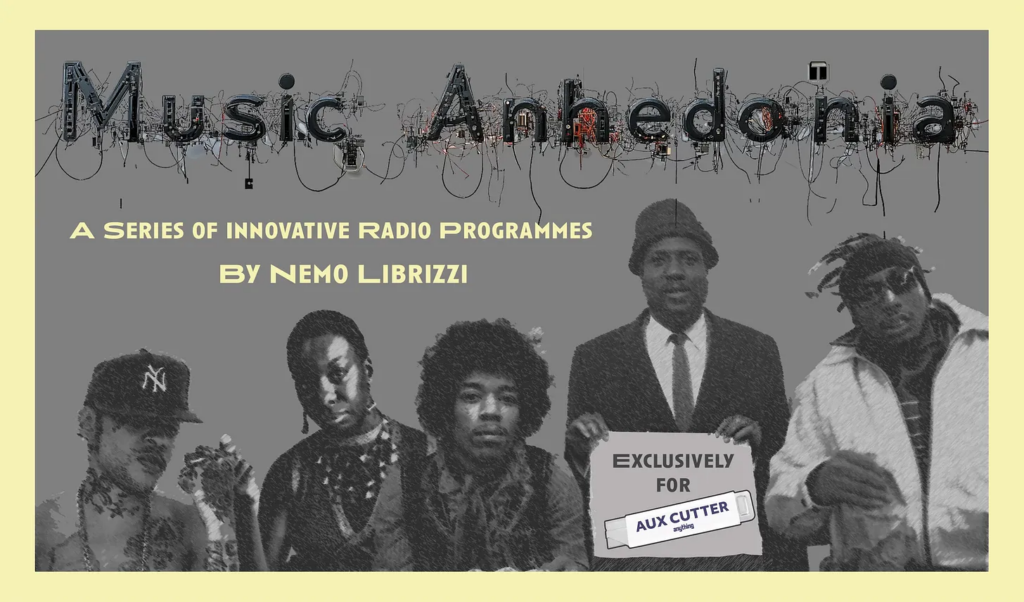

AUX Cutter: Let’s talk about the whole idea behind the premises of when you’re creating these shows.
Nemo Librizzi: Though I didn’t list it on any of the flyers, I did a one-off radio show for the old Know Wave station that I called “Music Anhedonia.” It’s named after a condition where the sufferer gets no enjoyment out of music. For example, you could play them Michael Jackson or Mozart, and they won’t feel anything. They’d ask, “Why would anybody want to hear this arrangement of noises?” I kind of wanted to call the whole series “Music Anhedonia,” even though each show has its own name.
AUX: That’s the theme behind this body of work, right?
Nemo: Yeah, but I didn’t brand it that way. Maybe I should going forward, or I could even go back and rebrand it. It’s a funny and somehow appropriate name for my approach to radio.
AUX: Hey, let’s talk about some of the past radio shows you’ve created. There’s one show—how do you say that word? Haecceity?
Nemo: Haecceity. I don’t even know. It’s just one of these interesting words I stumbled upon in my studies. A word attached to an obscure philosophical concept. It gives me a little kick to hear these rare words, so they come across as good names.
AUX: And that show was based on a philosopher?
Nemo: Yeah, Ludwig Wittgenstein.
AUX: So, what was the underlying influence for this show?
Nemo: Honestly, my YouTube feed. The best $11 I spend every month is my YouTube Premium subscription. The algorithm has me pegged so well that it suggests different music according to my diverse tastes, but it also recommends scholarly documentaries. I’d always heard about Wittgenstein but never did the reading in college. One night, I watched an old video about him and then fell down a rabbit hole studying more. It’s not just his philosophy, but his way of life that was really intriguing. I sensed parallels, not just in myself but in a lot of Bohemian guys in our generation. He was one of the first of us, living a certain unorthodox lifestyle in a pre-modern age. His pioneering example inspired me. With all the music bouncing off his words, it just seemed to come to life.
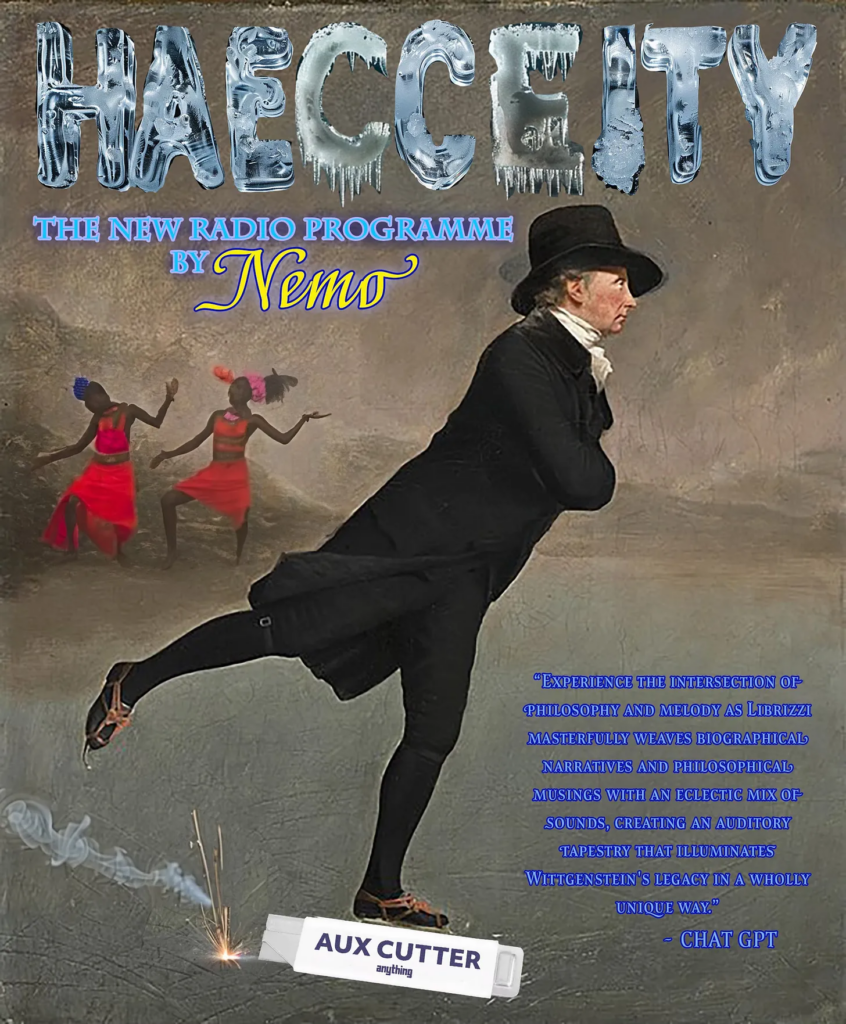
Ladies and gentlemen, prepare to witness a seismic shift in the cultural landscape! Aux Cutter proudly presents an unparalleled auditory experience that will redefine the very essence of radio. Join us as the legendary Nemo Librizzi takes center stage, orchestrating a groundbreaking fusion of music and intellect that will echo through the annals of history.
Immerse yourself in the poetic brilliance of “Haecceity,” an extraordinary musical collage that intertwines the profound biography of the towering philosopher Ludwig Wittgenstein with an eclectic symphony of melodies. This is not just a radio program; it is a monumental artistic event, a once-in-a-lifetime journey through the labyrinth of Wittgenstein’s mind, meticulously crafted by Librizzi’s genius.
AUX: Your shows are like meditations. It’s almost like Ashtanga Yoga—the flow and sequences are the beads of all the movements. From spoken words and samples to the songs, it’s all like one long track. They’re not playlists; it’s just one continuous sequence.
Nemo: Exactly. Our friend Jim Jarmusch once complained to me, “Oh, you only play little pieces of songs.” And, of course, I took it to heart because he’s my mentor. But when I got home, I thought: they’re not pieces of songs. It makes for one whole collage. Often, I do play the whole song, but sometimes you don’t need to. Especially if it’s a song we all know well. Sometimes, just a little piece of it suffices to butt up against the next thing and the first thing it follows in the dialogue.
Nemo: Going back to the idea of how your shows collage audio experiences, you could put a whole image or song, or you could just put an eyeball or snippet of a track. And then there was “Magnetic Declination.”
Nemo: Yeah, “Magnetic Declination.” It came from a YouTube thing I was watching about navigation. Apparently, at some point, magnetic north is at a different angle than true north because the compass needle points to where there’s a lot of iron ore deposits, but it’s not absolute north. Justifying true north against magnetic north is what Magnetic Declination means.
AUX: Your shows have titles as if they are paintings. “Magnetic Declination” is the compass, and whatever people claim—northwest, south, all that stuff—is it really accurate? Or is it just made up to keep people on their path? Like how some people stay up and get creative at night. Do you sleep at night or work at night? Who’s to make the rules? Everyone can just create their own paths, and that’s the key. “Magnetic Declination” is the name of that painting, and that painting is that collage run-on radio show. You used Rene Ricard as a theme for this show.
Nemo: You know, Rene was such a wild man in his everyday life. Yet, he was a strict classicist when it came to poetry. Like a guy with deep religious views who couldn’t help but gamble or go to strip clubs. A man has one way he keeps heading, but then he’s got another way he thinks he should head. So we’re always kind of looking at our compass to gauge the way we’re headed versus where we think we should be headed.
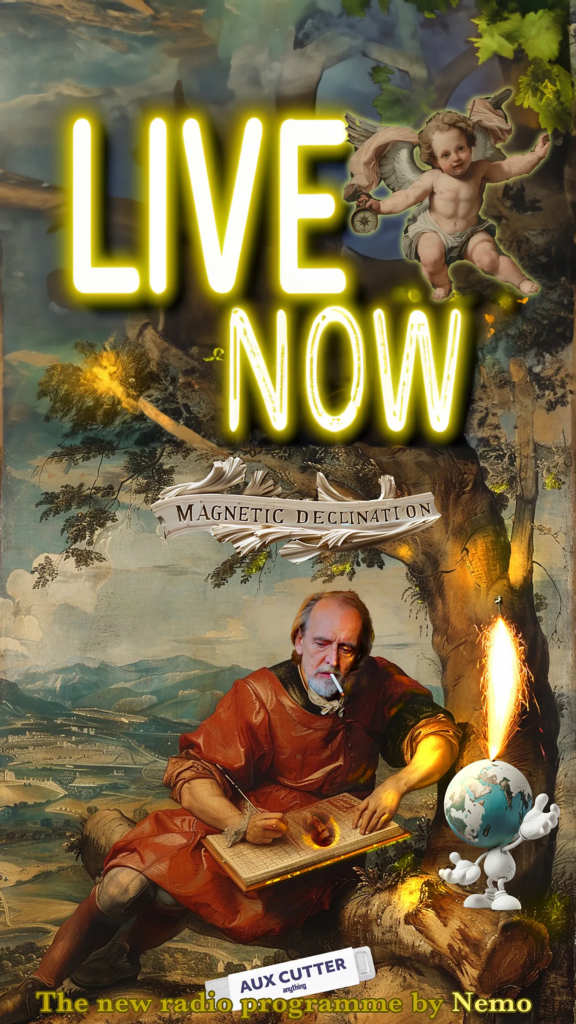
AUX: And then there’s the third radio show, “Sad About a Greek Pot.” Give us a little more info about this title.
Nemo: “Sad About A Greek Pot.” I was on an airplane watching a documentary about the Romantic poets—Keats, Shelley, Coleridge, and Wordsworth. I love hearing about their wild lives, even though I don’t always understand their poetry as well as I understand rap. When I hear rap music, like the moment you switch on the Wu-Tang Clan, I know just what they’re talking about. When I hear Keats or Shelley, I have to think a lot. What the hell are they trying to say? Keats has the famous poem “Ode on a Grecian Urn.” We don’t talk that way anymore, so I translate it to “Sad About a Greek Pot,” obviously a joke on their ivory tower poetry. To be fair, in their own time, they were talking directly to the people. Everyday people were reading poetry back then, just like everyday people today listen to rap music.
AUX: So Shakespeare was speaking in slang back then.
Nemo: Exactly.
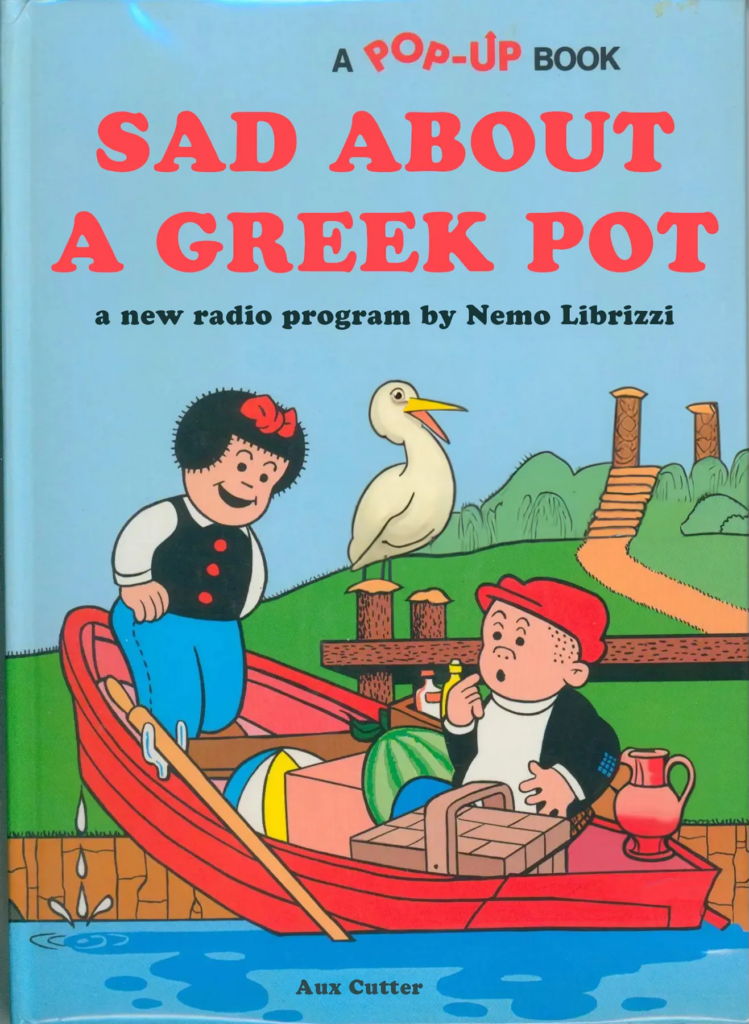
AUX: All right, there’s a new show coming up.
Nemo : I have two new ones already in the can because I’ve been working feverishly. One is “Melodious Plot” with William Burroughs on the cover.
AUX: What’s the idea behind “Melodious Plot”?
Nemo: That comes from “Ode to a Nightingale,” another poem by John Keats. I like the play on words. The verse describes a place where songbirds are singing, a place where you sit and can hear the birds chirp. But I like that “plot” also means when something foul is going on behind the scenes. People today feel that way about a lot of politics and business—something’s not right, and behind the dog and pony spectacle, something fishy is going on. William Burroughs was always the king of that point of view. I use clips from a 1970s movie famous for the soundtrack Stevie Wonder made for it, though I didn’t include any of his music in the mix. “The Secret Life of Plants” weaves into the idea that there’s a lot more going on with plants than we could ever imagine. They’re basically sentient beings. Once you plug them into equipment, you can understand what they’re going through, what they’re thinking, what they’re processing. A friend in college played Mozart for his marijuana plants and shut all the competition down

AUX: I like what you’re talking about. The poetry of the melodious plot, the birds chirping in the background—we don’t understand them, but they’re plotting. It’s the same with plants, right? They’re forever plotting because they’re hearing what we’re saying when we’re walking by. They’re getting everything in passing, all this information from the ground up, in the air, absorbing it. So they’re forever in the plot.
Nemo: There you go. They’re in on something that we can only guess. I had already sent in another show, “Tempo Rubato,” even before “Melodious Plot.”
AUX: I like the cello with the eyes, him smoking a cigarette, blowing out the smoke, and saying, “Talent hits the target others can’t hit. Genius hits the target others can’t see.” Yeah.
Nemo: I think that’s the one where I quote Ramanujan. Wait. No, now I’m getting confused. Oh, that’s where I used Mozart. Ideas from the film Amadeus about Mozart and back to the Magnetic Declination idea of the artist as a nut job.
AUX: All these little worlds you’re creating out of sound have so many narratives to get lost in. I also like that you play songs you might not even love, but at that moment they speak to you, helping to tell the story of whatever you’re thinking about. Even some of the offbeat songs you’re choosing have some rhyme and reason at the moment when you’re creating the show.
Nemo: It’s kind of like making a stew and placing an onion in the pot. You would never bite into an onion; you wouldn’t eat an onion on its own. Some music I would never listen to on its own, I find it ugly or displeasing, but it’s great in the mix right alongside beautiful music. The Music Anhedonia approach!
AUX: That’s the eclecticness of it all because it kind of jumps around and feels all-encompassing, a wide net. Your palate might discover anything in that $11.99 bag of tricks.
Nemo: My $11.99 YouTube hookup. “Tempo Rubato” means stolen time. If a composer writes down music a certain way, usually
Nemo: My $11.99 YouTube hookup. And “Tempo Rubato” means stolen time. If a composer writes down music a certain way, usually he assigns the melody to a time signature. But in some passages, the great composers will say this is on “tempo rubato”. So, according to the particular performance and skills and feelings, of a musician, you want to speed it up here. You may want to slow it down. That’s really up to you. You can improvise with the time. Thats how I feel as a composer of already found objects in music, I’m stealing my own kind of time from them. I’m putting Ghostface together with Janis Joplin, or I’m mixing, you know Duke Ellington with Kid Creole and the Coconuts, and maybe it’s the first time these sounds and unique voices have ever met. So I’m stealing them away from their their expected context.
AUX Right. Going back to the Magnetic Declination. Like you’re a compass for where the music is going.
Nemo: – I’m the standard. The way I’m feeling right now is the standard. And luckily, the way I feel is based on the elections, based on the summer heat, based on the climate change, based on women’s rights to have children or to have abortions, this unsolvable situation in the Middle East. All these things are affecting me in a similar way as they’re affecting other people. So I think people will hear themselves reflected in the way I’m listening to and presenting the music.
AUX: Dope, dope, dope. All right. Cool. That’s that for now. I’m gonna stop the recording.


